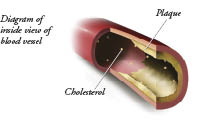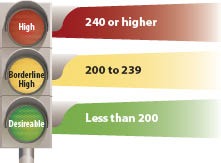National Center for Health Promotion and Disease Prevention
High Cholesterol

Talk With Your Health Care Provider About High Cholesterol
What is high cholesterol?
Cholesterol is a fat-like material that provides structure for your body's cells. Your liver makes most of the cholesterol your body needs, but you also get some from the foods you eat. Too much cholesterol can cause a sticky substance (plaque) to build up in your blood vessels. This plaque can block blood vessels and cause heart attacks and strokes.

Most people with high cholesterol feel healthy and don't have symptoms. The only way to know if you have high cholesterol is to have your cholesterol checked.
How is cholesterol checked?
Cholesterol is checked with a blood test. The test works best if you don't eat or drink anything for at least 8 hours before the test.
What do the cholesterol numbers mean?
Your total cholesterol is made up of two types of cholesterol: LDL (low-density lipoproteins) and HDL (high-density lipoproteins).
High levels of LDL increase your chances of heart disease. It is sometimes called the "bad cholesterol."High levels of HDL decrease your chances of heart disease. It is sometimes called the "good cholesterol."
Total Cholesterol Levels

Your provider will usually look at your total cholesterol first. Your total cholesterol should be under 200. If you already have heart disease or you have heart disease risk factors, such as smoking, diabetes, or high blood pressure, your provider will also look at your LDL and HDL results.
If your cholesterol is in the desirable range and you are healthy, have it checked again in 5 years.
If your cholesterol is borderline high or high, or you have heart disease, your next step depends on your LDL and HDL levels and your other conditions or risk factors. Ask your provider these questions:
What should my cholesterol levels be?Do I need treatment for my cholesterol?
What can you do to prevent or control high cholesterol?
Follow a healthy eating plan.
Read food labels and limit foods high in saturated fat, trans fat, and cholesterol.Eat plenty of fruits, vegetables, low-fat dairy foods, and whole grains.
Ask to see a registered dietitian if you need help with a plan.
Be physically active.
"Physical activity" includes any activity that raises your heart rate, such as brisk walking, working in the house or yard, or playing sports.Do activity for 10 minutes or more at a time. Aim for at least 2 hours and 30 minutes of activity each week.
Achieve and maintain a healthy weight.
If you are overweight, ask your provider for help with an eating and physical activity plan to lose weight
What else can you do?
Always ask your provider what your cholesterol numbers are and write them down. Keep track with the log at the MyHealtheVet website.
Your provider may prescribe medicine to help lower your cholesterol.
Take your medicine every day, or as directed by your provider.If your cholesterol numbers get lower, it's because your medicine is working. Don't stop it or take a lower dose unless your provider says you should.
Here are some questions to ask your provider:
Is my cholesterol under good control?When should I have my cholesterol next checked?
What is a healthy weight for me?
Is it safe for me to start doing regular physical activity?
For more information, please contact your local VA Medical Center or Health Clinic.



















